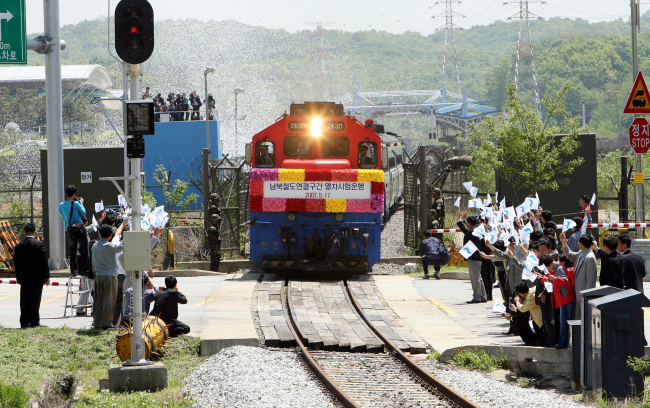[Newsmaker] Connecting railways: precursor for broader economic cooperation
By Yeo Jun-sukPublished : April 29, 2018 - 15:34
With the two Koreas’ leaders pledging to restore now-defunct railways and roads during the summit, hopes are high that the initiative will prompt cross-border cooperation in the economy and logistics.
President Moon Jae-in and North Korea’s leader Kim Jong-un agreed to adopt “practical measures” to connect and modernize the Gyeongui Line and East Coast Line. The former is between Seoul and Sinuiju, while the latter had connected the South’s coastal city of Busan and Wonsan of the North.
The agreement is expected to boost the Moon administration’s efforts to enhance economic ties with North Korea by modernizing its logistic networks, but the concern persists whether it would clash with the international sanctions targeting the communist country.
“Connecting the transportation networks between the two Koreas is a starting point for economic cooperation and social exchanges. If the circumstances permits, we will start off by reconnecting the Gyeongui Line and East Coast Line,” Cheong Wa Dae said after the summit.

Established in 1905, Gyeongui Line had linked Seoul to Sinuiju, a border town with China, until it was disconnected during the 1950-53 Korean War. The line was restored in 2003 for joint economic projects, but shut down again in 2008.
Designed to connect Busan to Wonsan since its establishment in the 1930s, East Coast Line was disconnected during the Korean War as its northern parts were destroyed. Despite the decision to restore the parts in the early 2000s, the restoration works have remained unfinished.
South Korea’s official said the government will focus on finalizing the work of rebuilding the northern part of the East Coast Line, connecting Jejin Station to Gangneung, Gangwon Province, while modernizing the Gyeongui Line, which is considered too dilapidated.
“With repair and maintenance, the Gyeongui Line can be operated right now. Regarding the East Coast line, rebuilding the disconnected railway is a priority,” Ji Yong-tae, who oversees inter-Korean projects at South Korea’s state-run railway operator Korail, said in a media interview.
The efforts are expected to add momentum to the Moon administration’s initiative of reconnecting the two Koreas via high-speed railways by modernizing North Korea’s antiquated railway system.
Under the initiative called “New Economic Map for the Korean Peninsula,” Moon laid out a bold vision to extend South Korea’s railway system, which can connect Seoul, Pyongyang, Dandong and Beijing.
Such ideas were reflected during the summit with Kim Jong-un, who praised the quality of the South Korean railway system that he said had impressed the North Korean delegates participating the PyeongChang Winter Olympics Games in February.
“If the railroad is connected with the North, both the South and North can use high-speed trains,” Moon said, responding to Kim’s remark that he would be “embarrassed” to see North Korea’s transportation if he travels to Pyongyang.
North Korea’s railway system is considered to have been antiquated due to its lack of pavement and the shortage of power supplies. Its locomotive were also said to have suffered from frequent malfunctions.
But broader cooperation is more likely to occur after the international community lifts its sanctions on North Korea, which relies on the railway system for most of its shipment of products for economic growth.
In response to the North’s relentless nuclear and missile tests last year, the United Nations has passed a series of resolutions banning exports of coal, iron, lead, seafood and textiles and limiting the import of crude oil and refined petroleum products.
While building public infrastructure in North Korea itself does not violate UN sanctions, implementing business can undermine the current efforts to put a pressure campaign on North Korea, said Shin Beom-chul, a senior fellow at the Asan Institute for Policy Studies.
“I think North Korea had considered this part carefully in advance before the summit… Considering the fact the implementation of connecting the railways would clash with the spirit of the UN sanctions, we need to be cautious until the US-North Korea summit takes place,” Shin wrote in his report.
(jasonyeo@heraldcorp.com)








![[Kim Seong-kon] Democracy and the future of South Korea](http://res.heraldm.com/phpwas/restmb_idxmake.php?idx=644&simg=/content/image/2024/04/16/20240416050802_0.jpg&u=)







![[KH Explains] Hyundai's full hybrid edge to pay off amid slow transition to pure EVs](http://res.heraldm.com/phpwas/restmb_idxmake.php?idx=652&simg=/content/image/2024/04/18/20240418050645_0.jpg&u=20240418181020)

![[Today’s K-pop] Zico drops snippet of collaboration with Jennie](http://res.heraldm.com/phpwas/restmb_idxmake.php?idx=642&simg=/content/image/2024/04/18/20240418050702_0.jpg&u=)